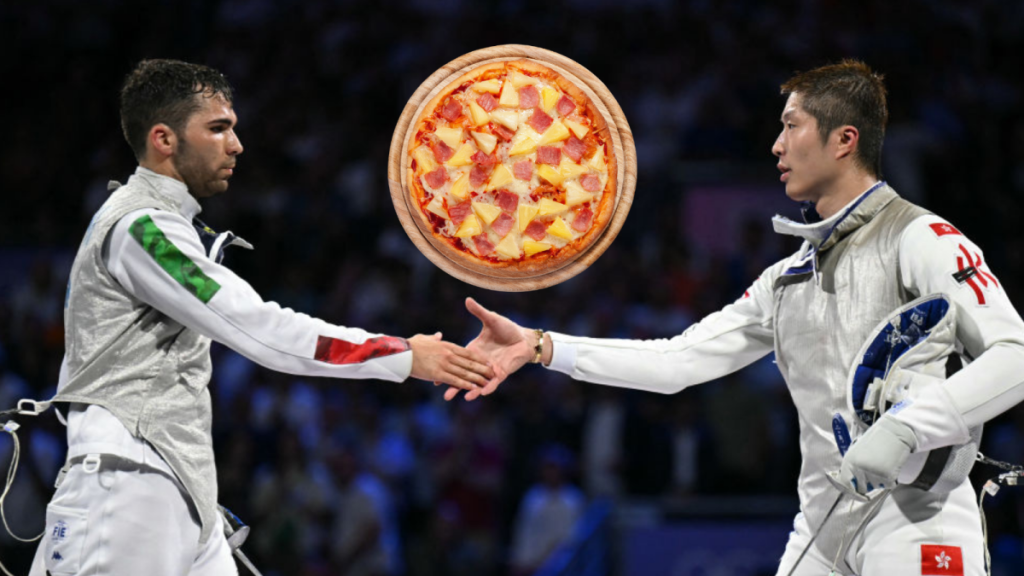The Olympic Games is an event intended to bring the world together, all nations joining hands to celebrate the heights of human athleticism. Of course, there are limits to this philosophy, as global politics and conflicts realistically can’t be entirely put aside.
Even so, some Olympic disputes are decidedly more petty than others. One such quarrel at the Paris 2024 Games now involves pizza, with a Pizza Hut promotion in Hong Kong and Macao going viral due to its cheeky jab at Italy.
Watch why the internet exploded over USA women’s rugby Olympic bronze win in last-second play
Earlier this week, Pizza Hut announced that customers in Hong Kong and Macao can have pineapple added to their pizzas free of charge until July 31.
“If you are a foodie, choose the Italian style and add pineapple,” Pizza Hut Hong Kong & Monaco wrote on Facebook (translated via Google Translate). “Or add Hawaiian style with pineapple, starting from $139 [$US18]!”
The post was accompanied by a graphic showing a fencer with three pineapple rings threaded on their sword.
Pizza Hut’s promotion seems specifically designed to rile up Italians by ostensibly ruining one of their most famous dishes. Pineapple on pizza has long been a controversial topping, with many considering it tantamount to sacrilege (albeit typically in a joking manner).
However, this lighthearted potshot didn’t come out of nowhere. Pizza Hut’s pineapple promotion came hot on the heels of Hong Kong defeating Italy in fencing for gold at Paris, responding to the latter’s poor reaction to the loss.
The Olympic fencing controversy between Hong Kong and Italy
On Monday, at Paris’ Grand Palais, Hong Kong fencer Ka Long Cheung defeated Italy’s Filippo Macchi to win the 2024 Olympic gold medal in the men’s fencing individual foil event. The close bout ended with a score of 15-14 after going to sudden death, with Macchi putting up an impressive fight against the defending champion at his first ever Olympic Games. There were even two moments where the judges had to review video footage to determine whether the winning 15th point had been scored, though no point was awarded both times.

Filippo Macchi of Italy and Ka Long Cheung of Hong Kong.
Credit: Al Bello / Getty Images
Cheung eventually emerged victorious after a video review of a third contentious point was ruled in his favour. Unfortunately, both Cheung’s gold and Macchi’s silver have been marred by what appears to be some rather poor sportsmanship.
Shortly after the match, the Italian Fencing Federation (IFF) announced it was filing a formal protest against the results with the Fédération Internationale d’Escrime (the governing body of Olympic fencing) and the International Olympic Committee. In particular, the IFF took issue with the referees’ home countries of Taipei and South Korea, alleging that they were too close geographically to Hong Kong to arbitrate fairly.
Mashable Top Stories
This seems a strange argument considering that the entire history of international conflict suggests physical proximity bears little relation to whether countries actually like each other. As such, many people online have attributed the IIF’s complaint to anti-Asian racism.
“Filippo Macchi is the real winner and he was denied a gold he deserved,” said IFF president Paolo Azzi in a statement (translated via Google Translate). “The selection of referees is a problem but the level of refereeing was below the great final we saw.”
The gold medal match was refereed by Huang Hao-Chih from Taipei, with Suh Sangwon of South Korea acting as the video referee. Ayoub Ferjani from Tunisia and Vilem Madr from the Czech Republic served as assistant referees. These four judges had previously refereed Macchi’s 15-11 semi-final win against U.S. fencer Nick Itkin, albeit with Ferjani and Huang acting as referee and video referee respectively.
Macchi’s quarter-final win against Egypt’s Mohamed Hamza was also overseen by Madr and Tim Claus Bardenhagen, whose respective home countries of the Czech Republic and Germany are notably closer to Italy than Egypt.
The IFF did not raise any objection to the choice of referees in either of these previous matches.
Italy’s apparent sore loser behaviour wasn’t confined to IFF officials. People from both Italy and Hong Kong quickly took to social media to insult the opposing athletes, the match referees, and each other. Such comments have ranged from sharing offensive food combinations to more aggressive and mean-spirited attacks.
It isn’t all vitriol, though. While Macchi, Cheung, and the judges’ Instagram comment sections still contain mean-spirited posts, there are many congratulatory and appreciative sentiments as well.
For his part, Macchi is leading by example by accepting his Olympic silver medal with class and grace. The Italian fencer acknowledged fans who felt he’d been robbed of gold, but said he considered himself fortunate to have come in second.
“I’ve heard of all kinds, they robbed you, outrageous arbitration, it’s a shame,” Macchi wrote in a post on Instagram (translated via Instagram). “Yet I’m reminded that I’m one lucky guy. I’m 22, a beautiful family, amazing friends, and a girlfriend that constantly leaves me speechless.
“I came second in the most important competition for any athlete playing a sport, and because I play this sport I learned that referee decisions must be respected, always! I know both referees, I don’t feel like pointing a finger at them and blaming them for my lack of success even because it would lead to nothing but creating an alibi for me. What has happened is in the past, now it is gone, what will happen in the future is up to me!”
Macchi’s mature response appears to have earned him the respect of many, whether they’re from Hong Kong or elsewhere. Fortunately, the men’s fencing individual foil wasn’t his only chance of winning gold at the Paris Olympics. The Italian fencer is currently scheduled to compete against Poland in the men’s foil team quarter-finals next week. He’ll no doubt have quite a few more people cheering for him now.
